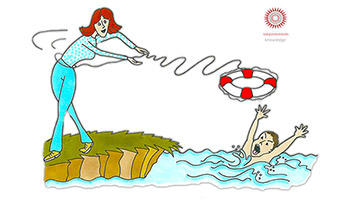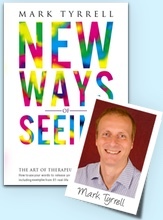
If your client is just trying to stay afloat, clever techniques are often unnecessary
“‘And this, too, shall pass.’ How much these words express! How chastening in the hour of pride! How consoling in the depths of affliction.”
—President Abraham Lincoln quoting a 12th century Persian Sufi teaching story during a speech in Milwaukee on 30 September 1859
It was sheer, brutish bad luck.
Her mother was dying and had come to live out her painful final days with her.
Her brother’s wife had died a month before at age 45 from an aggressive cancer.
Her brother had attempted suicide and needed her support.
Her teenage children seemed depressed and her daughter was self-harming.
Her husband had lost his job, and she too was soon to be made redundant.
Her whole house needed rewiring, but of course, there was no money.
And now, the final straw. That morning a letter from the hospital had starkly asked her to retake a medical test, as the last one had been inconclusive.
She’d stopped sleeping, laughing or smiling. Life had become an exercise in endurance.
When she finally spoke, it was with little energy.
“I’m not usually this self-pitying,” she said. A ghost of a polite smile played on her lips, but her eyes betrayed a world of pain as she fought the gathering tears. “But there’s so much going on, and I feel like I’m no longer strong enough to bear it.”
So was Leila a suitable case for treatment?
Prefer to watch instead?
When is it a problem, and when is it just life?
We all know that the reason for some clients’ problems is that past emotional conditioning has impaired their ability to deal with adversity, or led them to harmful behaviour patterns.
The fundamental problem for people prone to depression, low self-esteem, anger, and addiction is that they have come to respond to life in ways that cause them problems even when, outwardly, their life seems perfectly okay.
Clients like these need support, of course, but they also need help adjusting their ‘filters’ so that their emotional responses align with how their life actually is – not how it once was. They need help developing the skills to manage anxiety and anger, decondition painful memories, and meet their needs in healthy ways.
But this is not the case for all clients. Some of our clients are essentially balanced, happy, productive people when circumstances are fine. But when they’re going through a terrible time, it’s only natural that their ability to meet their needs is compromised.
In this case, our job is to skilfully support them, and to help prevent the current harshness of life from causing emotional conditioning that will harm their coping mechanisms later on, even when things have improved.
I’ll never forget what Leila said in our first session…
Pathologizing a natural response instead of offering shelter from the storm
“I went to my doctor last week, and she told me I am a depressive. She suggested I take antidepressants and accept that I will always have to live with depression. That really shocked me.”
It shocked me as well.
“Have you ever been depressed before, Leila?” I asked her.
“No, it’s built up slowly. I was a happy, confident person, Mark. I enjoyed life. I love my family. It was a real blow to be diagnosed as a depressive, because I thought I just felt so bad because of all that’s going on…”
She trailed off. I looked her squarely in the eye and, thinking fast, said:
“I met someone once who had what they call Congenital Insensitivity to Pain. They get knocked, pierced, bruised, boiled or broken, and… they feel nothing. That is a medical condition. These people don’t even know they are being damaged because their signalling system doesn’t work. There is nothing ‘wrong’ with a person who suffers when times are painful.”
I decided to deliver my message more strongly.
“You are not a ‘depressive’, Leila. There would be something wrong with you if you didn’t feel the pain of what’s been going on! (1) The pain lets you know that things need to change. I’m not here to label who you are or try to hand out some miracle cure for your pain. I’m here to help you manage that pain so you can get some control back… and maybe even a little comfort… until times get better.”
When the rain comes down and the wind rages, all we need is somewhere secure, warm and dry until the storm settles. What we definitely don’t need is medication.
Lean on me when you’re not strong
Clients like Leila don’t need analysis, a trawl through their past, or psychiatric labelling. They need support for what is happening now.
So how can we best support our clients through tough times?
1. Let them know it’s okay to not feel okay, because things are not okay
When I talked to Leila about Congenital Insensitivity to Pain, I was using an analogy. I showed her that it’s more normal to feel anguish and pain and fear when our primal human needs are blocked than not to feel those things.
If someone feels depressed because their life has become depressing, this isn’t any more pathological than someone feeling pain in their toe when they stub it. In fact, this is an analogy I’ll often use with clients who feel like they are inherently ‘ill’ just because they are mentally suffering through the hard times.
It’s when the depression and anxiety continue during times that are objectively non-threatening that there’s a problem. That’s when we need to do more than just support the person emotionally (as vital as that is!).
But sometimes, all people need to do is give themselves permission to feel terrible for a while when life really is awful.
Leila’s problems were real, and the last thing she needed was for someone to tell her she had some innate biological disorder for feeling she was at breaking point, or imply that her feelings were a sign of weakness. Just hearing me tell her that wasn’t the case seemed to take a little bit of the weight off her shoulders.
Even when everything is bleak, we can still help our clients get a little of what they need from life.
2. Help them meet their needs… a little
Human Givens psychology shows that we all share certain basic human needs. But the ease with which we can meet these needs expands and contracts. When it’s easy to meet these needs, we feel happy and safe. But when it’s harder to meet those needs – for supportive attention, meaning, feeling safe and secure, intimacy, connection to community and so forth – these are the hard times.
I encouraged Leila to talk on Skype to a really good friend of hers for half an hour at least once a week. This wouldn’t make everything okay, but it would – at least a little – help her feel listened to when she wasn’t seeing me.
She was getting help with her mother’s care from a nurse who ‘practically lived’ in her house, so it was possible. We looked at small ways in which she could meet other needs too, including the next tip:
3. Help them see that they deserve a break
We all need a break sometimes. I’m not talking just about a lucky break here, I’m talking about an emotional break. A break from stress and worry, fret and anguish.
It’s one thing to have something (or many things) stressful or painful happen to you. It’s another to churn it all around over and over in your mind until you fall into a spiral of depression.
There are two potential problems here: the actual problem, and the way people inwardly torture themselves with the problem. The less you ruminate about a problem, the easier it will feel to manage.
That’s not to say that some reflection isn’t inevitable – and sometimes even helpful – when things go bad. But it needs to be controlled. When it is allowed to get out of hand, a client can start to spend all their time terrifying themselves with catastrophic imagined outcomes or painful regrets. We know that excessive rumination fuels depression, and that’s exactly what we want to avoid.
I don’t like to offer platitudes, or tell clients I understand when it’s not me who is going through it. But I do like to suggest that everyone needs a safe haven. Somewhere they can go to leave their heavy burdens at the door, shelter from the howling gale outside, recuperate, and refresh.
When people can compartmentalise their worry, even just a little, things become easier to handle.
I gently suggested to Leila that she could ease the pain of this arduous part of her journey if she could find a way to place that burden down and rest deeply – and do it often.
I even formed a hypnotic induction around this idea as I deeply hypnotised her. I saw her transform into a seemingly much younger woman as the tension melted from her face. I selected a specific hypnosis download for her to listen to every day.
I reassured Leila that I wouldn’t charge her for her sessions until she felt able to pay me. I realise not every practitioner is in a position to do that, but it felt right for me and it gave her some much-needed respite. But she needed something else too.
4. Imply the inevitability of change through metaphor
Months later Leila told me that one of the most useful things I did for her was to say: “It won’t always be like this. It will get better.” But actually I never said that to her. At least, not in so many words.
What I did do, as she let go of her tension and relaxed into a deep trance, was describe to her stone-hard, icy ground…
The ground looks as if it will always be that way. But even as winter freezes all that it touches, and harsh winds howl around, a tiny seed (of change) is developing just under the surface. At last, the clouds lift, warmth starts to seep through, and circumstances move on. And that little seed emerges from the ground, shoots, and starts to flower.
Though I never actually said “it will get better”, this and many other metaphors I used with Leila all strongly implied it, and helped her begin to feel the reality of that possibility – not just think about it on a cognitive level.
I also told her longer therapeutic stories of protagonists facing difficulties who find unexpected sources of strength and support, learn valuable lessons, and finally come through to the other side.
While she listened to these stories, it was as if she was living their journeys just for a moment, and she mingled her own strengths with theirs. I reminded her of who she really was outside of and away from “the slings and arrows of outrageous fortune.”
Each time she left one of our sessions, she left feeling sheltered and protected, relaxed and rested, and able to pick up her burdens again with renewed energy and optimism.
After the storm
During our sessions Leila gradually reconnected to her humour, and to her wider perspectives and strengths. And, bit by bit, the wheels of fate turned again toward better times.
Her mother died a peaceful death. Leila mourned, but didn’t feel out of control.
Her brother seemed a little happier.
Her husband found a new job.
Her daughter came to see me for help, and eventually overcame her self-harm.
After multiple follow-up tests, Leila finally received a clean bill of health.
Six sessions in, she had gotten a new part-time job.
And after a few weeks, the family had enough money for the much-needed rewiring.
Leila’s life took on balance again, a firm basis for meeting her needs and helping her loved ones meet theirs.
Sometimes a person just needs a strong, calm ‘holding pattern’ until circumstances improve.
We can’t prevent difficulty or tragedy in our clients’ lives, but we can help them live with or through it. We can’t take the place of a friend or partner, but we can keep people hopeful, calm, and even sane as they go through a tough time – because we all go through it sometimes.
Trials and tribulations are not ‘mental conditions’, they are part of life. The human condition is able to withstand so much, and nobody proves that better than Leila, who left our last session together beaming with happiness and pride.
If I’d been wearing a hat, I would have taken it off to her.
Our How to Lift Depression Fast course enables you to treat depression quickly, making a lasting difference in your clients’ lives. Read more about the course here.
Notes:










